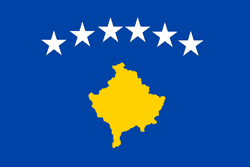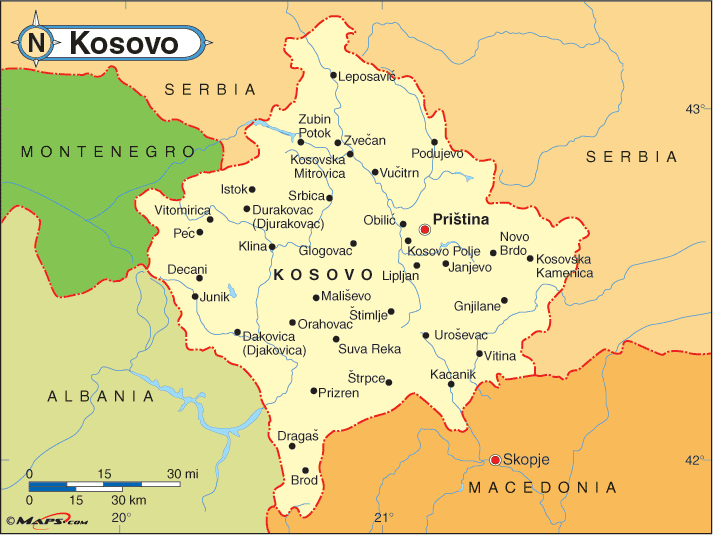KOSOVO

Geography: Kosovo is land-locked and mostly mountainous. It borders Serbia to the north and east, Montenegro to the northwest, Albania to the west, and Macedonia to the south. Kosovo is roughly the size of Connecticut.
Government: Republic. Kosovo, a former territory of Serbia, declared independence in February 2008.
History: The first inhabitants on the Balkan Peninsula were the ancient people known as the Illyrians. The Slavs followed in the 6th and 7th centuries. Albanian speakers began moving into Kosovo from the Adriatic in the 8th century. Kosovo was ruled by Bulgaria from the 9th century until Serbs gained control of Kosovo in the 12th century. Kosovo was the site of the Serbs' defeat by the Ottoman Turks in 1389. Kosovo was then absorbed by the Ottoman Empire. The battle at Kosovo Field figures prominently in Serbian poetry and has great national significance as the cradle of Serbian civilization.
The Ottoman Empire ruled Kosovo for centuries, until 1913, when Serbia resumed control over the region. Under Ottoman rule, the region grew increasingly more populated by Albanian speakers as a large number of Christian Serbs emigrated. (Albanians are largely Muslim.) In 1918, Kosovo became part of the Yugoslav Federation.
Government: Republic. Kosovo, a former territory of Serbia, declared independence in February 2008.
History: The first inhabitants on the Balkan Peninsula were the ancient people known as the Illyrians. The Slavs followed in the 6th and 7th centuries. Albanian speakers began moving into Kosovo from the Adriatic in the 8th century. Kosovo was ruled by Bulgaria from the 9th century until Serbs gained control of Kosovo in the 12th century. Kosovo was the site of the Serbs' defeat by the Ottoman Turks in 1389. Kosovo was then absorbed by the Ottoman Empire. The battle at Kosovo Field figures prominently in Serbian poetry and has great national significance as the cradle of Serbian civilization.
The Ottoman Empire ruled Kosovo for centuries, until 1913, when Serbia resumed control over the region. Under Ottoman rule, the region grew increasingly more populated by Albanian speakers as a large number of Christian Serbs emigrated. (Albanians are largely Muslim.) In 1918, Kosovo became part of the Yugoslav Federation.

Map of Kosovo
President: Atifete Jahjaga (2011)
Prime minister: Isa Mustafa (2014)
Total area: 4,211 sq mi
(10,908 sq km)
Population (2014 est.):
1,859,203
Capital and largest city (2007 est.):
Pristina, 400,000 (2007 est.)
Other large cities: Prizren, 110,000;
Peja, 70,000; Mitrovica, 70,000
Monetary
unit: euro (EUR); Serbian Dinar (RSD) is also in circulation
National name:
Republic of Kosovo
Languages:
Albanian (official), Serbian (official), Bosnian, Turkish, Roma
Ethnicity/race:
Albanians 92%, other (Serb, Bosniak, Gorani, Roma, Turk, Ashkali, Egyptian) 8% (2008)
Religion:
Muslim, Serbian Orthodox, Roman Catholic
Literacy rate: 91.9% (2007 est.)
Economic summary: GDP/PPP $14.11 billion
(2013 est.); per capita: $7,600 (2013 est.). Real growth rate:
2.5%. Inflation: 1.8% (2013 est.). Unemployment:
30.9% (2013 est.). Labor force: 800,000 (2011 est.),
agriculture 23.6%. Natural resources: nickel, lead, zinc,
magnesium, lignite, kaolin, chrome, bauxite. Exports: $408
million (2013): scrap metals, mining and processed metal products,
plastics, wood. Imports: $3.398 billion (2013): petroleum,
foodstuffs, machinery and electrical equipment. Major trading
partners: Italy, Albania, Macedonia, China, Germany, Switzerland, Turkey, Serbia (2012).
International disputes:
Serbia with several other states protest the US and other states'
recognition of Kosovo's declaration of its status as a sovereign and
independent state in February 2008; ethnic Serbian municipalities along
Kosovo's northern border challenge final status of Kosovo-Serbia
boundary; several thousand NATO-led Kosovo Force peacekeepers under
United Nations Interim Administration Mission in Kosovo authority
continue to keep the peace within Kosovo between the ethnic Albanian
majority and the Serb minority in Kosovo; Kosovo and Macedonia completed
demarcation of their boundary in September 2008.
-------------------- o --------------------
No comments:
Post a Comment